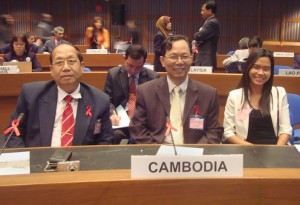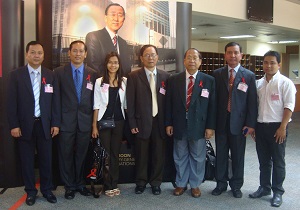Leading change at every level: HIV-affected women in Cambodia claim their rights
Date:

“It is my ambition to work as hard as I can and as much as it takes to ensure that women living with HIV are able to live in good health."
When the world of Dalish Prum, a young, softly-spoken Cambodian, was first shaken by the news of her HIV status, she couldn't fathom the positive meaning she would one day be able to draw from it - or the places that it would take her.
Just out of her teens, her initial experience was that of many women when they first learn of their HIV-positive status: confusion, frustration, isolation and fear.
But several years on, now 27, Prum has faced the illness head on. Finding support among the HIV-affected community in Cambodia, she began wanting to inspire those close to her, and those facing her situation. She chose to thrive, and to lead.
“HIV-positive women need encouragement and personal empowerment to move toward greatness in life in the future, she explains, now the acting National Coordinator of the Cambodian Community of Women Living with HIV (CCW), a national women's network and longstanding UN Women partner. “I recognize that I am a role model for young positive women in Cambodia, and with this comes the responsibility to show them how they can become stronger, live with no fear of HIV and take responsibility for HIV prevention to other people.
Prum's journey has been helped in part by support from UN Women and the European Commission focused on enhancing the leadership skills of women living with HIV. Addressing the hurdles of women in the country, where discrimination about their gender and their status often collide, Prum and her network members seek to make the AIDS response work for women, and to improve their access to HIV-related prevention, treatment, care and support. The network has been able to gain unprecedented access to the policy making spaces that determine Cambodia's AIDS response, in and outside of the country.

And in a country where female infection rates have increased in the last decade, key goals for CCW in Cambodia are improving sexual and reproductive health information and services for women, ensuring them better livelihood opportunities and addressing often intense HIV-related stigma, discrimination and violence.
Many of these efforts and challenges were under discussion during the XIX International AIDS Conference in Washington DC, and particularly at UN Women's satellite session: Women Leading, Organizing and Inspiring Change in the AIDS Response (22 July 2012, 1:30 -3:30pm), in which Prum spoke as a panelist. This trip wasn't her first.
This trip won't be her first. In February 2012 she was the first woman living with HIV to be included as part of Cambodia's official four-member government delegation at the UN ESCAP Asia Pacific high level intergovernmental meeting on HIV and AIDS, which took place in Thailand. Her participation at the meeting inspired a positive women's network in Indonesia to advocate successfully for representation in their official government delegation.
Investment in the leadership of HIV-affected women remains at a critically low level worldwide. Yet their active participation in high-level policy making forums has at least turned a corner in Asia and the Pacific, as Prum intends to highlight in Washington.
“They have a right to claim a positive future, she says. “I will make sure the voices, the hearts, needs and issues of HIV-positive women are heard.